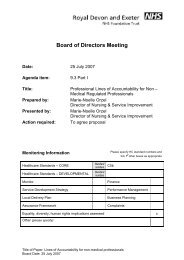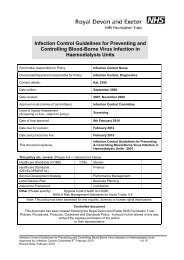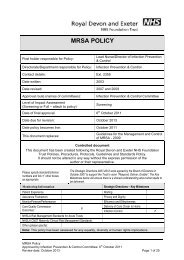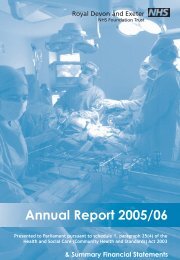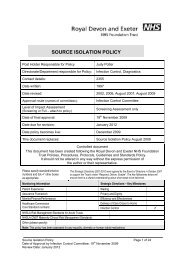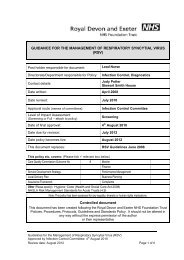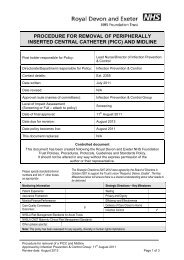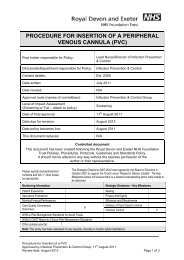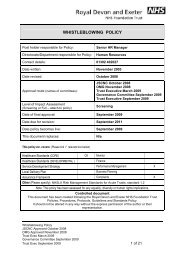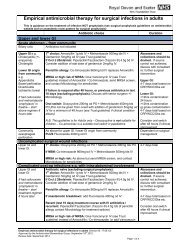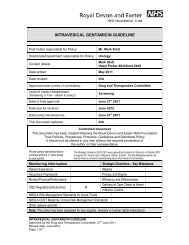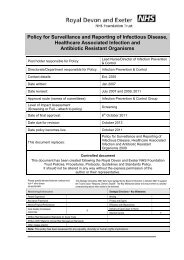Annual Report 2006/07 - Royal Devon & Exeter Hospital
Annual Report 2006/07 - Royal Devon & Exeter Hospital
Annual Report 2006/07 - Royal Devon & Exeter Hospital
You also want an ePaper? Increase the reach of your titles
YUMPU automatically turns print PDFs into web optimized ePapers that Google loves.
Infection Control<br />
Infection control is championed right across the<br />
Trust. Building on the National Patient Safety<br />
Agency (NPSA) ‘Clean your hands’ campaign<br />
and on the Department of Health ‘Saving Lives’<br />
initiative, our focus has been on infection control<br />
responsibilities at all levels. There are now<br />
infection control leads at board level, clinicians at<br />
directorate level and nurses at ward level.<br />
Members of the public are playing their part<br />
as well by responding positively to the new<br />
visiting times. As part of the Cleaner <strong>Hospital</strong>s<br />
campaign, one of the reasons for introducing<br />
restricted visiting in most wards was to allow the<br />
housekeeping staff easier access to bed spaces<br />
for cleaning. We have also had a good response<br />
when visitors are requested to postpone nonessential<br />
visits at times when wards are<br />
experiencing outbreaks of infection, or if<br />
visitors themselves are feeling unwell.<br />
On the clinical side, matrons and doctors<br />
have undertaken a thorough review using the<br />
Department of Health ‘Saving Lives’ assessment<br />
tools, of frequently performed invasive<br />
procedures where, by their very nature, there is<br />
a higher risk of infection. Policies, procedures<br />
and practice for urinary catheterisation, central<br />
and peripheral vein drips, surgical wounds<br />
and ventilator-assisted pneumonia have been<br />
checked.<br />
Progress has also been made ‘behind the<br />
scenes’, with Trust laboratory technicians being<br />
able to swiftly confirm whether or not a patient<br />
has got Norovirus. Knowing this one way or the<br />
other at an early stage of admission allows us<br />
to take prompt action to minimise the spread of<br />
the virus if infection is confirmed or in the event<br />
of test results being negative, giving the all-clear<br />
for the reopening of a ward to admissions.<br />
There is also a commitment to infection control<br />
in non-clinical areas, including food hygiene,<br />
portering and housekeeping services and waste<br />
management.<br />
As well as good practice here and now, the<br />
Infection Control Team has been involved in<br />
the design and equipping of existing and new<br />
healthcare facilities to ensure the environment<br />
encourages effective<br />
infection control.<br />
In new facilities, it is<br />
essential to ensure<br />
installation of washable<br />
surfaces, the right<br />
number of appropriately<br />
located hand-washing<br />
sinks and doors which<br />
can be opened or closed<br />
without having to touch<br />
knobs or handles; there<br />
must also be sufficient<br />
space between beds.<br />
These are just some of<br />
the simple but effective<br />
decisions made, for<br />
example, with the new<br />
Centre for Women’s Health at Wonford.<br />
The micro-organisms that cause infection move<br />
with patients from the community into hospital<br />
and out into the community again. It is therefore<br />
important to ensure good communication between<br />
primary and secondary care, between the RD&E<br />
and the community hospitals. Unlike many other<br />
areas, there is a joint Infection Control Team<br />
employed by this Trust which provides a service<br />
to the RD&E and also to the <strong>Exeter</strong>, East <strong>Devon</strong><br />
and Mid <strong>Devon</strong> localities of the <strong>Devon</strong> Primary<br />
Care Trust as<br />
well as the whole<br />
of the <strong>Devon</strong><br />
Partnership Trust.<br />
This team also<br />
works closely with<br />
the <strong>Devon</strong> Health<br />
Protection Unit<br />
which provides<br />
infection control<br />
advice to nursing<br />
and residential homes. This approach ensures<br />
“We know that infection control<br />
is the number one concern among<br />
members of the public. It’s also the<br />
top priority for staff throughout<br />
the RD&E.”<br />
Angela Pedder, Chief Executive<br />
good communication, uniformity of advice and a<br />
consistent approach to infection control practice.<br />
4



